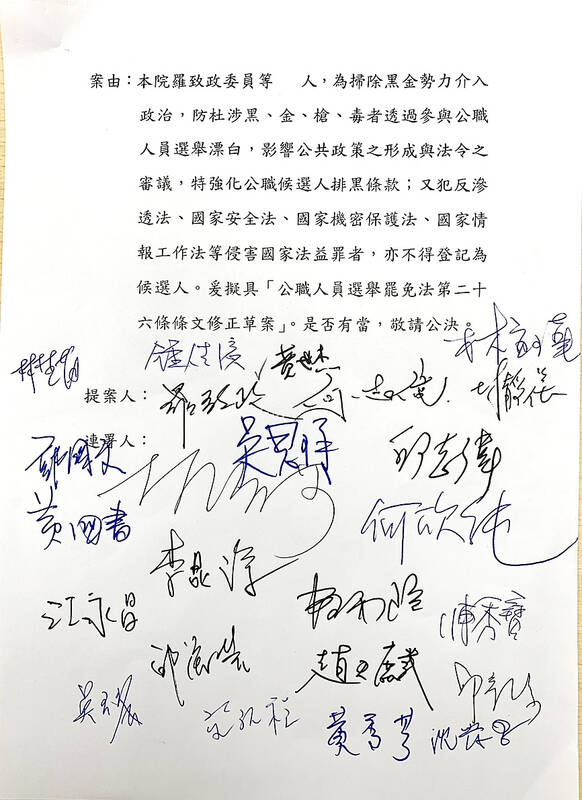Democratic Progressive Party (DPP) Legislator Lo Chih-cheng (羅致政) yesterday proposed a draft amendment to the Civil Servants Election and Recall Act (公職人員選舉罷免法) that would bar people who have been convicted of security breaches from running in national or local elections.
People convicted of offenses relating to organized crime, money laundering, firearms or drugs would be barred from election to civil servant positions if the amendments pass, Lo said on Monday, when the amendments were being drafted.
Since then, further restrictions were added barring candidacies of those who have been found guilty of security breaches under the Anti-infiltration Act (反滲透法), the National Security Act (國家安全法), the Classified National Security Information Protection Act (國家機密保護法) and the National Intelligence Services Act (國家情報工作法).

Photo courtesy of Lo Chih-cheng’s office
It is hoped that the amendments can be passed in the next legislative session, to begin in February, and promulgated before the 2024 legislative and presidential elections, he said.
The DPP caucus is waiting to examine similar proposed amendments that are expected from other lawmakers and the Executive Yuan, and would consider integrating their ideas before introducing its own amendment to the legislature, he added.
Lo’s draft is to be submitted to a preliminary committee review rather than undergo procedures for a second reading, as the amendments would have far-reaching effects and require a careful review, he said.
Separately yesterday, Premier Su Tseng-chang (蘇貞昌) instructed the Cabinet to submit its version of the draft amendments by Thursday next week, Executive Yuan spokesman Lo Ping-cheng (羅秉成) said, adding that the Cabinet version is to include input from additional stakeholders.
Lo Ping-cheng said Su has instructed him to supervise and direct the Ministry of Justice and the Ministry of the Interior to submit and pass the draft amendments “as an active response to public expectations” that people with such criminal records would be barred from the next national election.
The proposal is not meant to discriminate against former convicts, but to apply higher standards to those who would have public power and control public resources, the spokesman added.
Additional reporting by Chung Li-hua

INVESTIGATION: The case is the latest instance of a DPP figure being implicated in an espionage network accused of allegedly leaking information to Chinese intelligence Democratic Progressive Party (DPP) member Ho Jen-chieh (何仁傑) was detained and held incommunicado yesterday on suspicion of spying for China during his tenure as assistant to then-minister of foreign affairs Joseph Wu (吳釗燮). The Taipei District Prosecutors’ Office said Ho was implicated during its investigation into alleged spying activities by former Presidential Office consultant Wu Shang-yu (吳尚雨). Prosecutors said there is reason to believe Ho breached the National Security Act (國家安全法) by leaking classified Ministry of Foreign Affairs information to Chinese intelligence. Following interrogation, prosecutors petitioned the Taipei District Court to detain Ho, citing concerns over potential collusion or tampering of evidence. The

Seventy percent of middle and elementary schools now conduct English classes entirely in English, the Ministry of Education said, as it encourages schools nationwide to adopt this practice Minister of Education (MOE) Cheng Ying-yao (鄭英耀) is scheduled to present a report on the government’s bilingual education policy to the Legislative Yuan’s Education and Culture Committee today. The report would outline strategies aimed at expanding access to education, reducing regional disparities and improving talent cultivation. Implementation of bilingual education policies has varied across local governments, occasionally drawing public criticism. For example, some schools have required teachers of non-English subjects to pass English proficiency

‘FORM OF PROTEST’: The German Institute Taipei said it was ‘shocked’ to see Nazi symbolism used in connection with political aims as it condemned the incident Sung Chien-liang (宋建樑), who led efforts to recall Democratic Progressive Party (DPP) Legislator Lee Kun-cheng (李坤城), was released on bail of NT$80,000 yesterday amid an outcry over a Nazi armband he wore to questioning the night before. Sung arrived at the New Taipei City District Prosecutors’ Office for questioning in a recall petition forgery case on Tuesday night wearing a red armband bearing a swastika, carrying a copy of Adolf Hitler’s Mein Kampf and giving a Nazi salute. Sung left the building at 1:15am without the armband and apparently covering the book with a coat. This is a serious international scandal and Chinese

TRADE: The premier pledged safeguards on ‘Made in Taiwan’ labeling, anti-dumping measures and stricter export controls to strengthen its position in trade talks Products labeled “made in Taiwan” must be genuinely made in Taiwan, Premier Cho Jung-tai (卓榮泰) said yesterday, vowing to enforce strict safeguards against “origin laundering” and initiate anti-dumping investigations to prevent China dumping its products in Taiwan. Cho made the remarks in a discussion session with representatives from industries in Kaohsiung. In response to the US government’s recent announcement of “reciprocal” tariffs on its trading partners, President William Lai (賴清德) and Cho last week began a series of consultations with industry leaders nationwide to gather feedback and address concerns. Taiwanese and US officials held a videoconference on Friday evening to discuss the